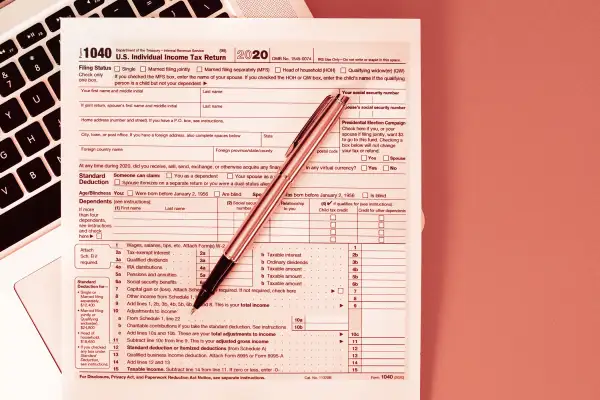When Are Taxes Due? Here's Every IRS Deadline (and Delay) You Need to Know This Spring

If you usually find tax season stressful, this year may be even worse. Yes, you have an extra month to file federal income taxes, after the IRS pushed the deadline to May 17. But between stimulus checks, unemployment benefits and different deadlines depending on your situation, you may have some questions.
“There’s absolutely been lots of confusion,” says Craig Richards, director of tax services at Fiduciary Trust International.
We’ve got you covered. Here are the 2020 tax deadlines to keep in mind:
What taxes are due April 15?
Estimated tax payments. Millions of taxpayers owe the government money on April 15 in the form of estimated tax payments, which go toward estimated taxes on income from the first quarter of this year (not for taxes on 2020 income, like the taxes due on May 17). This applies to Americans who don’t have their taxes withheld via their paychecks throughout the year and need to make quarterly payments to the IRS. This group includes independent contractors — like self-employed small businesses and freelancers — as well as taxpayers who receive income like interest, dividends, alimony, capital gains or prizes and awards. If you do have income tax withheld from your paychecks, but not enough, you may owe these payments also.
Gift tax returns. If you’ve given someone a gift worth more than $15,000 last year, the IRS requires you to fill out a gift tax return, Form 709. There are some exceptions, like gifts for education and medical expenses. The IRS’ tax deadline extension does not include an extension for gift tax returns. If you need more time, the American Institute of Certified Public Accountants provides recommendations on how to file for an extension.
What taxes are due May 17?
Federal income tax returns. In March, the IRS extended the deadline to file federal income tax from April 15 to May 17 after outcry from legislators and industry leaders who said taxpayers needed more time due to the pandemic. If you still need more time, you can file for an extension until October 15, but keep in mind that this extension would only apply to filing the return — you still need to pay the IRS any money you owe by May 17. Remember that stimulus checks are not taxable. While unemployment benefits are taxable, there is a tax break for some who collected those benefits.
Contributions to retirement accounts. The IRS also postponed the deadline to make 2020 contributions to individual retirement accounts (IRAs) and Roth IRAs. Contributing is a smart way to save for your future: a traditional IRA allows your investments to grow on a tax-deferred basis until the money is withdrawn in retirement, while a Roth IRA is taxed upfront, so your investments grow and can be withdrawn tax-free. The deadline to pay taxes on 2020 distributions from IRA or work-based retirement plans is also May 17.
Contributions to health savings accounts. The IRS also postponed the deadline to make 2020 contributions to health savings accounts (HSAs). These accounts are typically available to people with qualifying high-deductible insurance plans and have a triple tax advantage: in addition to making tax-deductible contributions, savers can accrue tax-free earnings and make tax-free withdrawals for qualified medical expenses. The IRS recently announced that personal protective equipment (PPE) with the primary purpose of preventing the spread of COVID-19, like masks and hand sanitizer, is now eligible to be paid or reimbursed through HSAs.
Unclaimed 2017 tax refunds. Last week the IRS announced that around 1.3 million taxpayers are leaving unclaimed income tax refunds worth more than $1.3 billion on the table. If you didn't file a federal income tax return because your income is below the tax filing threshold, but you're owed money, then you have three years to claim your refund. That window closes on May 17 for 2017 tax returns.
When are state taxes due?
While most states have followed the lead of the IRS in extending the deadline to file state income taxes to May 17 from April 15, there are some exceptions. For example, Hawaii is maintaining its April 20 tax deadline and New Hampshire — which does not have individual income tax on wages and salaries but does tax investment earnings — is sticking with April 15. Meanwhile, Maryland is giving its residents until July 15 to file state taxes as well pay first- and second-quarter estimated payments. Money has a full list of the tax deadline in each state.
If you spent time outside your home state during the pandemic, you may have to take the extra step of determining where you actually owe income taxes. Taxpayers need to file tax returns in the state in which they are domiciled (if that state has an income tax) and you can only be domiciled in one state, Richards says. That state is the one you think of as “home,” and where you plan to return to after being away. However, some states — including Connecticut, Massachusetts, New Jersey, New York and Pennsylvania — also tax “statutory residents,” or people who rent or own a home in a state other than their home state and spend more than 183 days there, Richards adds.
You can also check out TurboTax's guide to filing in multiple states.
More from Money:
How to Track Your Tax Refund and Any Stimulus Checks You're Owed From 2020
Answers to All Your 2021 Tax Questions, From Stimulus Checks to New Deductions
